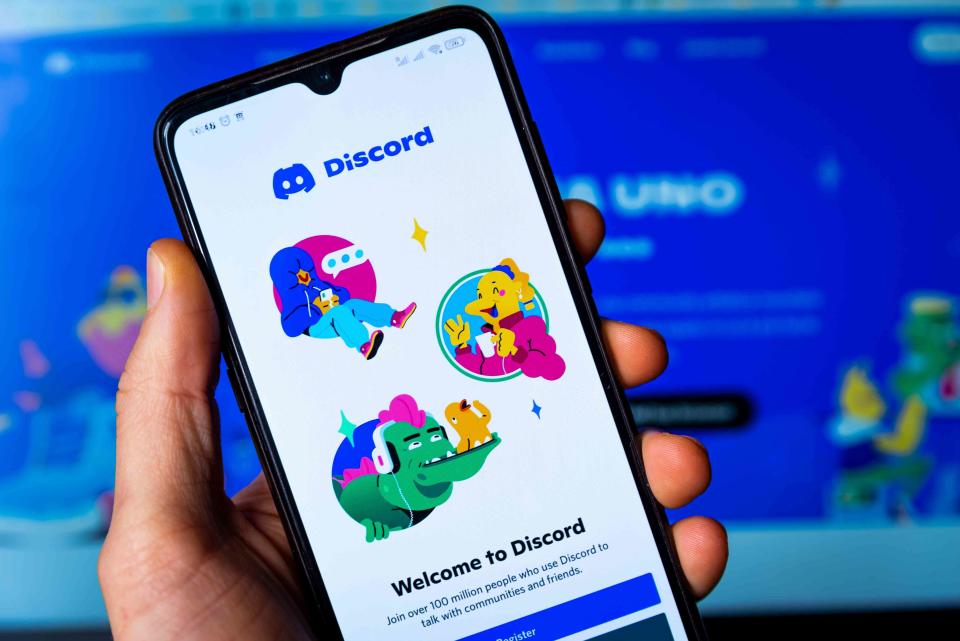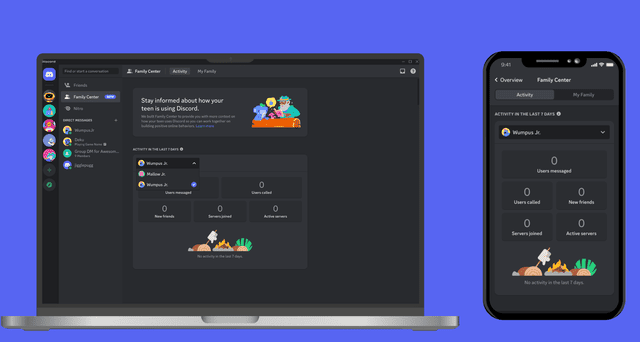How the Social Media Platform Discord is Helping Parents Keep Kids Safe
More teens are gravitating toward Discord, which just launched its Family Center for parents to keep an eye on their activity.

SOPA Images / Contributor / Getty Images
The social media app Discord is gaining popularity among teens. With more eyes on the platform, the company launched its new Family Center. The feature aims to provide safety tools to help kids, teens, and parents within the app. Discord also hopes it prompts conversations about navigating digital spaces.
"At a high level, Family Center gives parents a snapshot of their teens' activity on Discord, including recently added friends, servers joined and participated in, and users messaged or called within direct or group chats," says John Redgrave, the vice president of trust and safety at Discord.
Parents may not be familiar with Discord, but Gen Z is. Discord says half of Gen Z users log into the app multiple times daily, and more than 40% use it to connect with friend groups and communities. It can feel like it's yet another app and trend to get familiar with in an eco-system that just added Threads. But media and technology experts say it's important for parents to keep up with the ever-changing social media landscape.
"As parents, it's important to be multilingual when it comes to digital media and the platforms our kids have become increasingly fluent in," says Laura Ordo?ez, the head of digital content and curation with Common Sense Media, a media and technology rating nonprofit organization. "When we do have a better understanding of these spaces, we're more equipped to have impactful discussions with our kids and help them build healthy habits and good behavior in these digital spaces."
Will Discord's Family Center do the trick? Not on its own, but experts say it's a start.
Related: Montana Becomes First State to Enact Total Ban on TikTok
What is Discord?
Founded in 2015, Discord is a free app available on mobile and PC that lets people chat via text, video, or voice in real time, Ordo?ez explains. Gamers first gravitated to the service.
"Discord initially was used as a way for gamers to hold real-time voice and text chats in games that either didn't support real-time communications or where the in-game system wasn't robust," says Kayne McGladrey, a senior member of IEEE, a professional organization for technology and engineering.
But the platform gained popularity, particularly during the COVID-19 shutdown. "During the pandemic, Discord emerged as a free alternative to Zoom for gamers, friends, cryptocurrency enthusiasts, and other communities to host remote events," McGladrey says.
Teens also began to gravitate toward the app, which requires a user to be at least 13 to register.
"[Teens are] using it as a way to connect with others that have the same interests as them and are finding a sense of community and belonging, especially after feeling so much isolation during the pandemic," Ordo?ez says. "Its appeal to teens can also be attributed to the fact that it easily connects to their consoles as well as their favorite apps like Twitch and YouTube, which makes it a centralized location to stay connected with their friends wherever they go in the digital world."
Discord also has "Student Hubs" that lets users enter their student email addresses and find connections to classmates via a private server, where Ordo?ez says they can create study groups and interest clubs.
About Discord's New Family Center

Discord
Discord's Family CenterRedgrave says the goal of the Family Center within Discord is to help parents, guardians, and caregivers better understand how a teen uses the service.
More specifically, Ordo?ez explains that with Family Center parents can now know:
What servers their kids have joined or participated in
Everyone they've messaged
New users they've connected with
In order to do this though, parents will need to:
Create their own account
Go to user settings
Choose Family Center
The only catch—teens have to agree to give the parent access and must provide their parent with a time-sensitive QR code to finish activating the feature.
"We preserve teens' autonomy by requiring their consent to parental controls and allowing them to opt-out at any time," Redgrave says. "We built Family Center to help keep parents informed while allowing teen control over their Discord experience."
Related: Social Media Has Led to a Youth Mental Health Crisis—But Lizzo and Lawmakers Are Fighting Back
What Experts Think
Experts see pros and cons in the new Discord Family Center.
"It functions similarly to Snapchat's Family Center," says Marc Berkman, the CEO of the Organization for Social Media Safety. "Like Snapchat's Family Center, while Discord's new controls may marginally improve safety by allowing parents to preempt certain threats, we are of the opinion that they are largely impractical and ineffective at mitigating most of the risks threatening children on Discord."
These threats include cyberbullying, sexual predators, and mental health issues. Berkman worries teens can still create alternative accounts, skirting the Family Center's safeguards.
Ordo?ez was more optimistic, calling it a "step in the right direction." But she also pointed to flaws.
"The process for accessing and setting up the Family Center supervision may feel daunting for adults and is likely to garner some resistance from teens," Ordo?ez says.
Ordo?ez also clarifies that the new feature is not a full parental control feature. "It is a usage tracker," she says. "Yes, parents can see the usernames and server names their kids are interacting with, but they don't have access to the content in the chats or what they're talking about on video or audio calls."
Still, Ordo?ez is hopeful the new feature will do some good. "The information the Family Center offers is a great way to monitor any changes in behavior or interactions that might seem suspicious," she adds. "It also gives parents enough insight to ask informed questions and talk to their kids if they feel concerned. It may not be a set-it-and-forget-it protection measure, but it can help facilitate conversations between parents and kids about their digital habits."
Related: I'm a Parent and a Privacy Lawyer: Here's What I Will and Won't Post About My Kid Online
How to Help Your Child Navigate the Digital Space Safely
Is any space really set it and forget it these days? That's a loaded question. But, put simply, experts say parents need to discuss safe social media and app use with their children and teens. Experts share tips for these conversations.
Ask Questions
Ordo?ez says parents should first ask questions and prompt discussions with teens about what they are doing online.
"Ask your teens what their favorite platforms are, what kind of content they like, who they interact with, and how it all makes them feel," Ordo?ez says. "Teens will be more open to sharing if parents show interest."
And it's best to keep these conversations ongoing.
"By maintaining a consistently open and largely non-judgmental dialogue with teens, parents can help provide perspective, empathy, or seeking outside help as needed on a day-by-day basis," McGladrey says.
Be Mindful of Your Own Digital Habits
Constantly staring at your phone? Discussing the latest Facebook fight you got in over dinner? It happens—especially these days. But Ordo?ez says it's important for parents to role model positive digital and social media use.
"When kids see their parents and caregivers setting digital boundaries, it gives them the encouragement to do the same," Ordo?ez says.
Berkman agrees. Parents and children should set boundaries together and stick to them. "Parents need to implement social media safety rules, which are the rules that parents want their child to follow whenever they use social media," Berkman says. "A basic example is that younger teens should only be communicating on social media with people that they know in real life."
Stay Calm Under Pressure
Seeing that your teen overstepped a boundary—or worse, engaged in cyberbullying or looked at pro-eating-disorder content—is understandably troubling. Ordo?ez suggests thinking before responding.
"Parents should not overreact," Ordo?ez says. "Taking away a phone or shutting down all social media may not be the most effective punishment. Many teens use their devices to cope with mental health problems by seeking out information, advice, and support."
See if you can understand why they participated in the behavior and better ways to cope with issues in the future. If your child is in distress, seeking assistance from a mental healthcare provider can be pivotal in helping them manage and cope.
Related: 8 Best Apps for Keeping Tabs on Your Kids
For more Parents news, make sure to sign up for our newsletter!
Read the original article on Parents.
